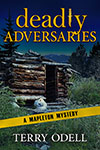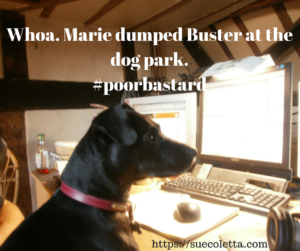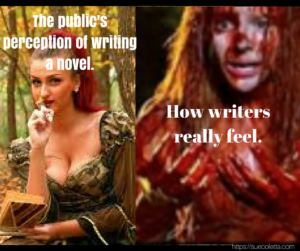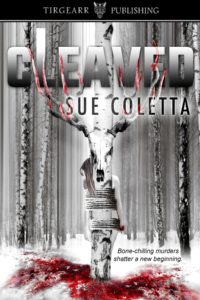To blog or not to blog? That is the question. (For thriller and mystery writers, that is.) Whether ’tis nobler in the mind to suffer the slings and arrows of outrageous troll comments or bravely take pens against a sea of **crickets**.
If Shakespeare were alive in this internet day, my bet’s the Bard would blog—despite the extraordinary effort required to consistently publish and the resounding risk of no return. He, himself, said so: “The heart-ache and the thousand natural shocks that flesh is heir to, ’tis a consummation.”
We writers on the Kill Zone, and we followers of our blog, are not Shakespeare. We’re resilient mortals, albeit with self-doubt and insecurities, and consumed with pursuing the written word. Including weakly weekly words pounded out on WordPress.

Is blogging worthwhile for thriller and mystery writers? My take? Absolutely!
I hit the blog publish button on June 30, 2012, and I have no regrets. I’ve put out 400+ pieces on DyingWords.net, and it’s returned more satisfaction than I can count. Money? No, not directly. But there’s a much bigger picture to author blogging than direct monetary reward.
Let me count the ways. Blogging has helped build my writing and technical skills, it’s allowed me considerable craft experimentation, it’s educated me in so many ways, it’s forced discipline and motivated me to meet deadlines, and blogging has let me network with like-minded writers on an international scale. I’ve built a brand through blogging, I’ve met influencers or force-multipliers, and I’ve been humbly invited to guest post on prominent sites.
Looking back, I see blogging has done one overall and invaluable thing for my writing adventure. It’s given me discoverability. Being discovered on a global scale loops back to indirect commercialization—making money by having readers buy my books. Blogging has been so, so worthwhile, and I will not lose momentum.
“And thus the native hue of resolution
Is sicklied o’er with the pale cast of thought
And enterprises of great pitch and moment
With this regard their currents turn awry
And lose the name of action”
~William Shakespeare / Hamlet
Running a regular blog isn’t for every thriller and mystery writer. Quite frankly, it’s a lot of bloody work. Many writers see blogging as a time suck with a low entry barrier where they compete with hacks who pollute the blogisphere with, well… shite.
 I don’t worry about that. I’ve learned to do my own thing, and it’s slowly paid off. I look at blogging as a long-term venture—not some sort of a get-rich-quick scheme. (Spoiler Alert — nothing quick about getting rich with writing, and even Wild Bill Shakespeare made little money during his world-changing career.)
I don’t worry about that. I’ve learned to do my own thing, and it’s slowly paid off. I look at blogging as a long-term venture—not some sort of a get-rich-quick scheme. (Spoiler Alert — nothing quick about getting rich with writing, and even Wild Bill Shakespeare made little money during his world-changing career.)
However, none of us are Bards, yet there’s never been a better time to be a writer. I sincerely mean this. We have amazing tools and resources to build our skills, cull our craft, network, and get discovered. Let’s look at why thriller and mystery writers should blog.
Improving Skills
Practice makes perfect. Although there’s no such thing as perfection—as far as I know—writing is a skill to be learned. It’s not Shakespearean-God-given talent for almost all of us. Whether you aspire to quill the next great American novel, outsell Rowling and King, or stack readers to your mail list, serious writers strive to improve. It’s a daily slog through other blogs and seeing what currently works.
What currently works for others may not work for you. “Current,” in blog terms, is as recent as a whale sighting. Blog things change fast. They surface and dive, but writing basics really don’t. Many times, blogging is about making old things seem new.
My experience in improving skills? Practice by publishing. Polish Erase the purple prose. Edit with efficiency. And keep on learning.
Experimentation
What’s writing without experimenting with your voice? “What’s voice?” my cow’s milk cheese, white bread, and raw leek sandwich once asked. Until I started blogging, I had no concept of “voice.”
Blogging taught me to free my voice. No, it’s not like free as in clothes-dropping and whirling-around-the-stripper-pole that my new neighbor Pamela Anderson performed in her video with Elton John. And yes… seriously… I’m not messing with you. Pam Anderson is my new neighbor, and that’s for a blog at another time.
See. I just experimented with my writing and my voice, and I know you’re going to read it when I post What I See With My Cabala’s Tripod-Mounted Bushnell Telescope When Pam’s Bedroom Blinds Slightly Crack.
Education
My blog has a tagline. It’s “Provoking Thoughts on Life, Death, and Writing.” Life. Death. Writing.
 The blog–trogs of yesterday and the top-bloggers of today say, “Stick to your niche.” I didn’t know what a niche was when I started blogging. Till then, I thought a niche was my sister’s daughter.
The blog–trogs of yesterday and the top-bloggers of today say, “Stick to your niche.” I didn’t know what a niche was when I started blogging. Till then, I thought a niche was my sister’s daughter.
But I learned what a niche was, and I found it. Education is a good thing. Education is something you’ll learn in spades when you blog. Continual education has let me learn to blog a lot about life, death, and writing. From that, I’ve learned a ton.
Discipline, Motivation & Deadlines
This is where my cop training came in—long before I was a writer. I was humiliated and soul-crushed in basic training—never mind physically worked to the mat—but I learned mental toughness and the power of teamwork.
Teamwork, motivation, deadlines, and discipline invoke mental toughness. It’s the underscore or underline of personal achievement. To put out blogs or articles, writing pieces day after day, and believe in yourself as a professional scribe, you have to psychologically put yourself in a winner mentality.
Discipline is putting your butt in your chair and your fingers on the keys. Motivation is personal—motivation is believing in your purpose and knowing you have deadlines. Deadlines are having this post up on the Kill Zone every second Thursday morning.
Blogging does this.
Networking
That’s why we’re all here at the Kill Zone. Not just the regular contributors who always have to constantly improve, experiment, educate, discipline/motivate, and meet deadlines. We network. And we critique each other. Often silently.
Blogging—and in my opinion—no better media lets you network more than blogging. I don’t mean just following my blogsite, or TKZ, or the hoards of SM-listed blog sites. There’s a whole wide world of blogging out there, and there’s a secret. That’s to tap into the blog community you want to be recognized by.

It’s by commenting.
Everyone in this TKZ thriller and writing community wants to network. Bloggers and followers inclusive. Sure, some contributors are prominent names and some commentators are new. Putting your comment on a TKZ post is a powerful networking move. Be assured prominent people are reading your comment, and they’re influencers who’ll help lift you.
Influencers/Force Multipliers
Writing. Blogging. Publishing. Marketing. This is a cooperative community. Not a competitive one. We help others to help themselves.
Influencers are folks who have gone before. They may be writers who’ve “made-it” as traditional publishing names. They may be teachers who go above and beyond to help other up-comers in indie publishing. And they may be peers who share what currently works, and what doesn’t for all of us in this crazy biz called writing, regardless of how you’re published.
Force-multipliers are big hitters. They have the success, credibility, and presence to endorse new-comers and guys like me. That might be an encouraging return comment on a blog post comment, or a SM shout-out reaching thousands.
Discoverability
Your return—your magic reward—from thriller and mystery writing blogging is discoverability. Yes, there’s a learning curve and a lot of work, but it’s so, so worth it.
I’ve blogged for over nine years. My followers aren’t huge by some scales, but I’ve amassed 2,100 qualified email list followers. My website clicks are around 800 a day. And when I send a DyingWords.net post out every second Saturday morning at 8:00 PST precisely, I get about 350 faithful readers clicking through.
These faithful readers discovered me through my blog. I look at it this way—if I called a town hall meeting every second Saturday morning and 350 showed up—with my bookselling table at the back of the room—I’d be happy with my blogging audience.
I don’t have a town hall, but my table is virtual, and my venue is open 24/7/365—internationally. It keeps growing as my blog keeps feeding it, and the spin-offs from my blog help discover me.
My secret sales sauce? Discoverability. It used to be called, “Word of Mouth.” Now it’s, “Word of Mouse.”
To me, as a Thriller and Mystery writer, “To blog or not to blog” isn’t the question. It’s the answer.
What about you Kill Zoners? Is blogging worthwhile?
——
 Garry Rodgers is a retired homicide detective with a second career as a coroner responsible for investigating unexpected and unexplained human deaths. Now, Garry has reinvented himself as a crime writer and indie publisher.
Garry Rodgers is a retired homicide detective with a second career as a coroner responsible for investigating unexpected and unexplained human deaths. Now, Garry has reinvented himself as a crime writer and indie publisher.
An avid and active blogger at DyingWords.net, Garry Rodgers has also guest written for many sites including commissioned articles for the HuffPost. Garry lives on Vancouver Island in British Columbia at Canada’s southwest coast.
 Today commences our annual two-week hiatus here at TKZ. This blog has been hale and hearty since 2009, which is a testimony to the quality of our writers and commenters over the years.
Today commences our annual two-week hiatus here at TKZ. This blog has been hale and hearty since 2009, which is a testimony to the quality of our writers and commenters over the years. 
 I’m hoping this post will initiate some feedback/discussion, because this writer wants to know.
I’m hoping this post will initiate some feedback/discussion, because this writer wants to know.


 I don’t worry about that. I’ve learned to do my own thing, and it’s slowly paid off. I look at blogging as a long-term venture—not some sort of a get-rich-quick scheme. (Spoiler Alert — nothing quick about getting rich with writing, and even Wild Bill Shakespeare made little money during his world-changing career.)
I don’t worry about that. I’ve learned to do my own thing, and it’s slowly paid off. I look at blogging as a long-term venture—not some sort of a get-rich-quick scheme. (Spoiler Alert — nothing quick about getting rich with writing, and even Wild Bill Shakespeare made little money during his world-changing career.) The blog–trogs of yesterday and the top-bloggers of today say, “Stick to your niche.” I didn’t know what a niche was when I started blogging. Till then, I thought a niche was my sister’s daughter.
The blog–trogs of yesterday and the top-bloggers of today say, “Stick to your niche.” I didn’t know what a niche was when I started blogging. Till then, I thought a niche was my sister’s daughter.
 Garry Rodgers is a retired homicide detective with a second career as a coroner responsible for investigating unexpected and unexplained human deaths. Now, Garry has reinvented himself as a crime writer and indie publisher.
Garry Rodgers is a retired homicide detective with a second career as a coroner responsible for investigating unexpected and unexplained human deaths. Now, Garry has reinvented himself as a crime writer and indie publisher.

